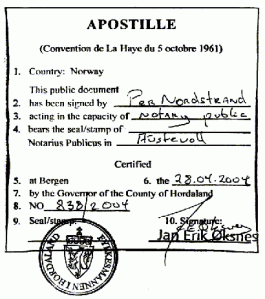
Arms of the See of Canterbury, governing the Church of England, mother of the Anglican Communion. (Photo credit: Wikipedia)
In a previous note, I described the re-appearance of the notary as Europe emerged from the Dark Ages. This was on the continent but in England, the pace of development was slower. The Papal General Council in 1237 noted that there were then no notaries in England. Why was this?
Brooke’s Notary explained that the separate development of the common law in England, unrestrained by many aspects of Roman law, meant that notaries were not introduced until the 13th and 14th centuries. The first known notarial instrument produced in England, a marriage contract, dates from 1257. (Patrick Zutshi, Notaries Public In England In The Fourteenth And Fifteenth Centuries.) Early English notarial instruments usually dealt with foreign matters, such as relations with the papacy. Notarial instruments only became common after 1279 when John Pecham, Archbishop of Canterbury, brought with him to England an Italian notary. Pecham was also authorised to create three more notaries in England.
The principal work of English notaries was ecclesiastical and administrative. A bishop would typically have a notary in his employ. Initially, most notaries were clerics. But with the clergy’s gradual withdrawal from secular affairs, more non-clerics were appointed.
As relative latecomers, the English notary’s scope of work was very much restricted. Zutshi, op. cit., observed:
“By the second half of the thirteenth century, when notaries public appear on the scene, the institutions of secular law and government in England were sufficiently developed, and indeed sufficiently elaborate and sophisticated, to allow only limited scope to the newcomers. ‘The English Common Law’, C.R. Cheney concisely observed of the notary public, ‘did not recognise him or his works’. Moreover, notaries were rarely employed in drawing up records of debt or contracts….The majority of English notarial instruments were in fact transcripts of judicial acts, charters and other documents.”
Or as explained by Gisela Shaw, Notaries in England and Wales:
“In England, notaries never attained the same prominence as they did in the continental European jurisdictions based on Roman law. As common law, with its preference for lay judges and oral testimony over trained lawyers and documentary evidence, increasingly replaced Roman law, the need for notaries began to diminish. The last major blow came in the 19th century with the transfer to the common law courts of the bulk of the business of the last two courts to apply Roman law, ie. the Court of Admiralty and the ecclesiastical courts.”
Originally, notaries were appointed by papal authority and by the Holy Roman Emperor. However, in 1320, Edward II prohibited notaries appointed by imperial authority from exercising their office to stress England’s independence from the Holy Roman Empire. Thereafter, notaries were appointed by the Papal Legatee, and later, by the Archbishop of Canterbury but still under papal authority. In Scotland, James III enacted a statute in 1469 placing the power of control over the admission of notaries in the hands of the king.
England under Henry VIII witnessed the separation of the church in England from that in Rome. This resulted in a basic change in the appointing authority for notaries. Under the Ecclesiastical Licence Act of 1533, it was the English monarch who assumed the power of appointment. The King in turn delegated the power to head of the Church of England, the Archbishop of Canterbury. And the power was then further delegated to the Court of Faculties which remains until today the appointing authority in England.
Legislation over the years have further regulated the appointment of notaries. The Public Notaries Act 1801 provided for the appointment of general notaries in England and Wales. In more recent times, the Courts and Legal Services Act 1990 removed barriers to competition amongst notaries outside of London. Notaries could not practice anywhere outside London and were not limited to specific districts. Scrivener notaries, of which more on a later occasion, became subject to the same professional regulations as general notaries under the Access to Justice Act 1999.


